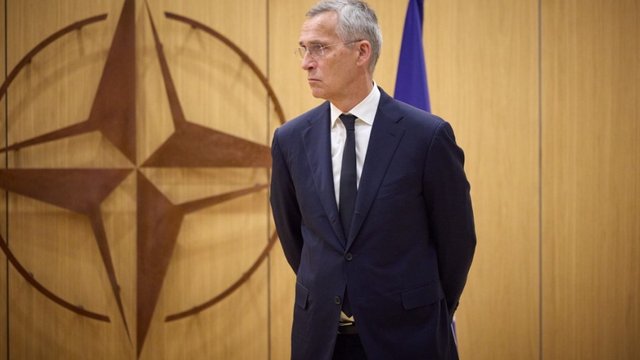Stoltenberg: It's for NATO allies to decide whether Ukraine can be invited to alliance with temporarily occupied territories

NATO Secretary General Jens Stoltenberg has said in an exclusive interview with the Interfax-Ukraine News Agency that it is up to NATO allies to decide whether it is possible to invite Ukraine to the alliance in conditions where part of Ukrainian territory is still occupied by Russians.
As soon as on Tuesday, October 1, the official ceremony of handing over NATO Secretary General powers to Mark Rutte, who was previously the Prime Minister of the Netherlands.
"It's for NATO allies to decide exactly how membership should be applied or work for Ukraine, but we all are aware of that. Of course, if we say that the only way for Ukraine to become a member is that the war to end and Ukraine is in full control over the whole Ukrainian territory, then we give President Putin all the incentives to just find a way to continue the war. But my main message is that NATO security guarantees is the way to ensure a lasting and just peace for Ukraine," Stoltenberg said.
Asked whether part of Ukraine could become a member of NATO, just as was the case of Germany, he said, "that's for NATO allies to decide."
"We have the possibility to decide if we want so. So again, I believe that this could be a way to ensure that when some kind of agreement is reached between Russia and Ukraine, and again it's for Ukraine to decide what is acceptable, then it can ensure that it stops there. And of course, that's for NATO allies to decide whether Article 5 guarantees can apply for parts of the Ukrainian territory," the Secretary General said.
He also emphasized that "it's for Ukrainians to decide what are the conditions for negotiations and what are conditions for an acceptable solution."
At the same time, Stoltenberg said that "if there is an agreement on a line, then, of course, we need to make sure that the war really stops there."
He recalled that the war "didn't start in 2022, it started in 2014. Then Russia took Crimea and then they went into Eastern Donbas a bit later."
"We had Minsk 1, a ceasefire agreement. After a short while, Russia violated that and moved the front line further west. Then in 2015, got Minsk 2. Russia violated that too and waited for seven years and then launched a full-scale invasion. So now we cannot have Minsk 3, a new line, which is not respected by Russia, but only gives them some pause to regroup and to relaunch new attacks. So therefore, this time we need to make sure that when we agree something, it has to be the end, it has to stop there. Therefore, we need to arm the future Ukrainian forces so they can deter further Russian aggression," the NATO Secretary General said.
"But also we need to provide security guarantees, which are credible. Of course, the most credible security guarantee will be NATO membership in our collective defence clause, Article 5. So, I believe NATO membership can be a way to ensure lasting peace for Ukraine and that really the war stops here," he said.









